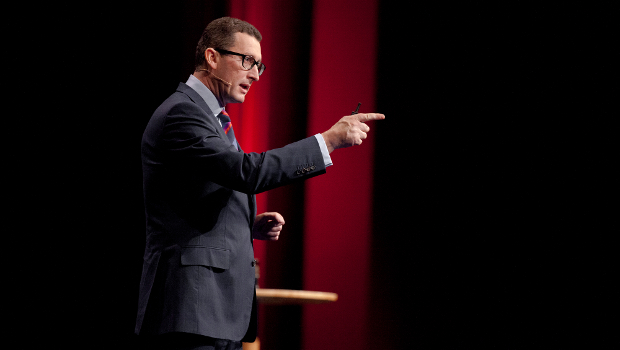Amid the clamour for cloud adoption in enterprise, Fujitsu sees a role for itself as a services orchestrator, bridging the gap between traditional and what it terms hybrid IT.
Adopting a global outlook, the company envisages a role for itself that focuses on bringing customers through the evaluation phase of the digital journey, and then facilitating implementation under its concept of human-centric innovation.
These were the overarching themes of Fujitsu Forum 2015, which took place in Munich in November.
Fujitsu is becoming more global, more about services and digital innovation, said Duncan Tait, Europe, Middle East, India and Africa executive vice president in a keynote.
Balance of solutions
Tait posed the question how do we rapidly bring ideas and technology together in a digital world?
“How can we balance traditional ICT with digital innovation to digitalise with confidence?” asked Tait. “Making the wrong choices can mean the end of your business or organisation.”
They key to this, said Tait, is to achieve a balance between traditional IT, with its advantages of robustness and stability, and the new world of cloud with its speed, scalability and availability.
“Fujitsu helps customers to achieve balance to thrive in a digital world and transform their business without disruption,” said Tait.
The imperative for enterprise to go digital was further highlighted by Gianluca Tramacere, research director, Gartner.
Digital revenue
Tramacere said that within five years, digitally attributable revenue is expected to double. More than three quarters (76%) of organisations see digital business as vital either important or vital to their success. Of these businesses, nearly half (42%) rely on service providers to support digital business initiatives.
He said that in order to accelerate digital business, some 38% of CIOs are already on the ‘bimodal journey’ in ICT, the majority of the remainder intending do so within the next three years. Nearly two thirds (63%) will increase technology investment to achieve this, but with a significant change in control of spend. Tamacere said that by 2017% half of the technology spend will be under the control of business, compared to 38% in 2015.
However, Tramacere warned that skills will be an issue amid this wave of digitalisation. He said that 42% of organisations reported a lack of digital skills, with more than half (51%) saying they cannot respond in a timely manner to digital demand. The top three skills currently in demand are enterprise architects, solutions architects and information security analysts. However, by next year, Tramacere said that the top skills in demand will be social network miner/analysts, digital business designers/architects and chief data officers.
A central plank of Fujitsu’s strategy to help customers with the digital transition is MetaArc. This is a “digital business platform that embraces the reality of two-speed IT landscapes by providing comprehensive foundations for cloud and digital businesses of the future”.
Fujitsu said that it “combines vision for evolution of existing cloud platforms, solutions and managed services with unrivalled integration and orchestration capabilities for Fujitsu’s own and third-party cloud services”.
“The key is the connection of digital initiatives to existing systems, helping customers with the modernisation of their IT estate and the integration, orchestration and management of resultant hybrid IT estate of cloud alongside non-cloud systems,” said Tait.
MetaArc will feature Fujitsu’s K5 Cloud Service as a core component, but will support services for big data, enterprise mobility and the Internet of Things (IoT).
Developments
Tait highlighted a number of key developments for Fujitsu, illustrating the implementation of its outlined vision.
The first was its work with the global energy management and automation provider Schneider Electric. In a major project for its EMEA operations, Fujitsu provided innovative workplace services enabling the digital workplace with its Workplace Anywhere solutions. The solutions allow organisations to mobilise business processes and the workforce to securely access applications and data on any device in any location.
Another announcement was around the company’s acquisition of French cloud company UShareSoft SAS. Tait said that it will form the basis of Fujitsu’s new European research and development centre for global cloud services.








Subscribers 0
Fans 0
Followers 0
Followers